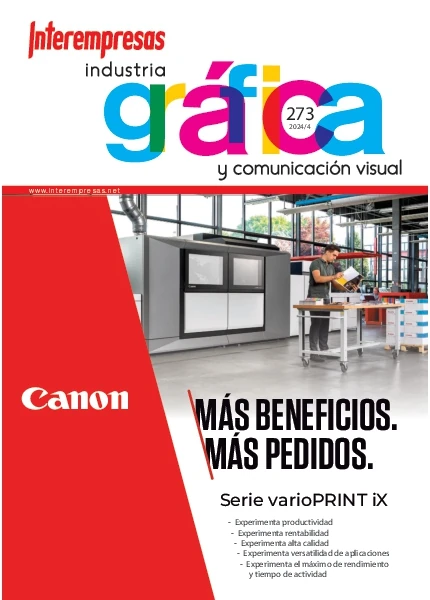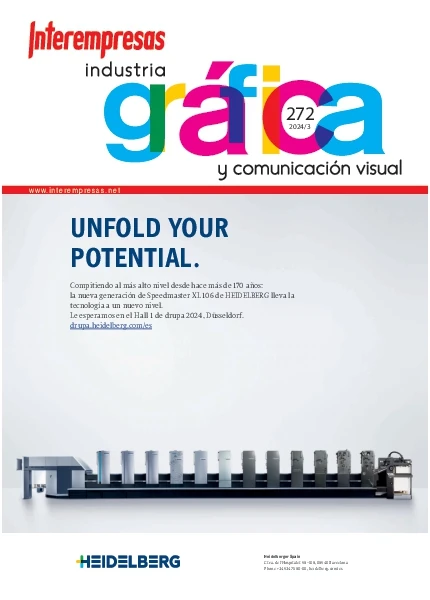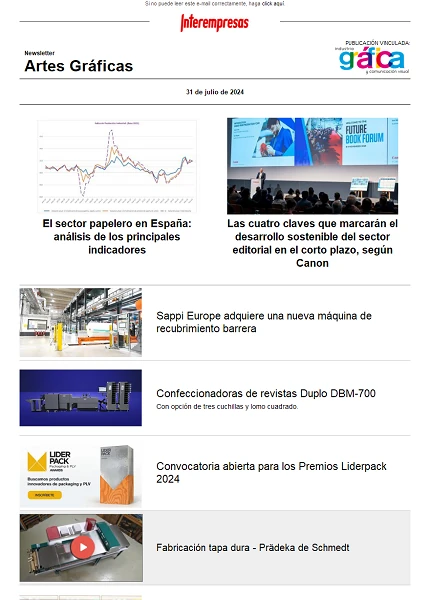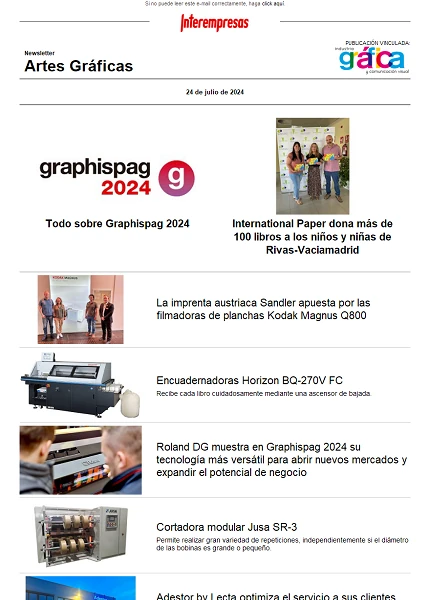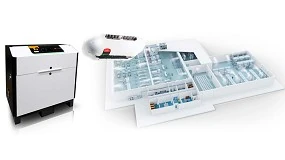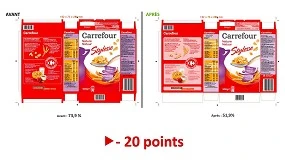New Memory of Sustainability of Aspapel
The paper bets by the efficient use of the natural resources and the low economy in carbon
25 November 2011
The new

The key is in the optimisation of the use of the wood, the natural and renewable resource in that it bases the production of paper. It treats to produce cellulose and paper from the wood, and besides bioenergy, biofuels, biocomposites… in green factories, that generate green employments in rural zones; and to produce paper recycled in urban zones, in integrated factories with installations of management of waste, obtaining also the maximum aprovechamiento of the recycling of the paper and the cardboard, using the waste of the process in the manufacture of products moldeados, insulating, biocomposites of waste of paper… and in the last resort valorizando his energetic power.
The paper grows in the trees and does to grow the trees
The paper yes grows in the trees. Therefore it is natural and renewable. And besides the paper does to grow the trees: more paper means more trees and more rural employment.
More paper = more trees
In Spain, the wood with which does the paper plants and cultivates in 359.000 hectares of plantations, managed sosteniblemente, that are continuously regenerating and replantándose and contribute to increase the surface arbolada.
More paper = more rural employment
The plantations for paper suppose in the rural field some 4.120 direct employments related with the works of repoblación and selvicultura of the wooden crops. To these direct employments it is necessary to add almost 12.360 indirect employments (machinery, transport, workshops…) that suppose an important road of dinamización of the rural development.
- 359.000 hectares of plantations for the sector paper
- 4.120 direct employments and 12.360 indirect employments in the plantations
- 21 million tonnes CO2 equivalent stored (the eucalipto fixed to the year the double of carbon that the chestnut tree)
- forest Certification: 100% of the factories of cellulose; 100% of the providers of cellulose to integrated factories and 65% of the wooden providers, but only 7,5% of the forest surface.
More paper = less CO2
These plantations are big sumideros of CO2 (store 21 million tonnes CO2 equivalent: the eucalipto fixed to the year the double of carbon that the chestnut tree and five faster times that the encina).
Commitment with the sustainable forest management
33% of the factories of the sector (100% of the factories of cellulose) have certified his chain of custody. Also they are certified 100% of the providers of cellulose to integrated factories and 65% of the wooden providers. In spite of this, only 10,7% of the wood consumed by the sector in 2010 was certified. It is necessary now expand the national forest surface certified (at present only 7,5%, in front of 30% of European average).
Promote the national wooden offer certified, is the way to increase the offer of product certified in the market. In 2010, it was certified 24% of the production of cellulose of market and 6,5% of the production of paper.
The efficient factory
The environmental revolution starred by the industry of the cellulose and the paper in the last years, has done reality in the sector the concept of efficient factory, so much in environmental terms like economic. Energetic efficiency, efficiency in the use of water and efficiency in the management of the waste of the process are the three main pillars of this green revolution.
The almost whole of the production (93%) manufactures low systems of environmental management certificates.
Fuels cleaner and renewable
The natural gas supposes 64% of the fuels used by the sector and the biomass 34%, while the consumption of coal and fuel oil, that was already very low (5% of the total in 2006), reduces his weight until 2%.
Cogeneration, the efficient energy, recognised like MTD (Better Available Technology)
With an installed power in cogeneration of 1.105 MWe in 2010, the sector papelero no only produces the energy that consumes but it contributes his excedentes to the system. In spite of the economic crisis the installed power in cogeneration has attained some increase (25 MWe additional) regarding 2006.
The sector has achieved to decouple the evolution of the broadcasts so much of the production of paper and cellulose as of the generation of electricity
The total of broadcasts of CO2 of the sector is of 4,4 million tonnes. The broadcasts of UNDER2 and NOx situate in 2010 around 4.300 and 12.400 tonnes, respectively.
- 93% of the production with SGM certified
- Fuels: 64% natural gas and 34% biomass
- Cogeneration: 1.105 MWe of installed power in efficient energy
- 11% less than water used (2007-2010)
- 9% less than poured by t of cellulose and 10% less by t of paper (2007-2010)
- 61% of waste of the process valorizados into use direct agricultural, ceramic industry, composting, industry cementera…
Valorisation of the waste of the process
61% of the waste of the process papelero valorizan by distinct roads: agricultural direct use (32%), ceramic industry (10%), composting (9%), industry cementera (7%).
Less water and poured cleaner
With a similar production of paste and paper, the total utilisation of water in 2010 has reduced 11,2% regarding 2006. The poured have improved in all the parameters and also have followed diminishing in the period 2007-2010, until situating in 31,9 m3/tonne for the paste (in front of 35 m3/tonne in 2006), and in 7,8 m3/tonne for the paper (in front of 8,7 m3/tonne in 2006).
Recycling: the challenge to improve a success
The recycling of paper and cardboard in Spain is the history of the success of the effort and the collective commitment of the citizens, the public administrations and the own industry papelera. Splitting of a much more modest situation, have reached in few years the elite of the recovery and the recycling. In the society of the recycling, the industry papelera exerts a leading paper. The products papeleros are 100% recyclable and the paper is the material that more recycles in Spain.
Recover for his recycling 4,6 million tonnes of paper and cardboard used: 71,9% of the total of paper and cardboard that consume. And this figure supposes the permanence in the Club of 70%, in which already ingresamos in 2009, codeándonos with the leading countries all over the world in recovery of paper and cardboard.
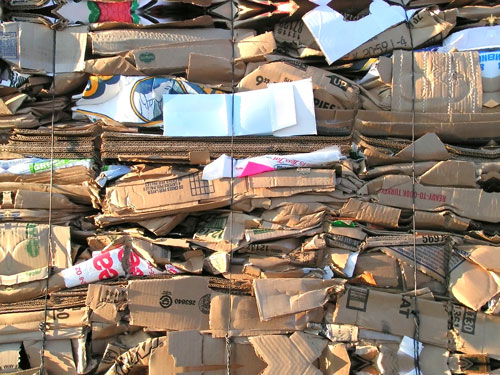
- 4,6 million tonnes of paper and cardboard used recovered for his recycling (71,9% of the total of paper and cardboard consumed)
- 5,1 million tonnes of paper used recycled by the industry papelera Spanish, in head of the alone European recycling behind Germany.
The industry papelera Spanish recycled in 2010 more than 5 million tonnes of paper used. This data situates us in command of the recycling in Europe, only by behind Germany in volume of paper recycled, and practically empatados with France and Italy in the second position.
The cycle of the paper, the cycle of the life
Stepping further of the responsible consumption, today the society sues integrated products in the natural cycle, that proceed of the nature, are recyclable and return to the nature. And few products like the paper can fulfil satisfactorily all these requirements that poses already the consumer of the future in this society of the recycling and of the bioconsumo.
The answer is in the own nature that innova without ceasing to guarantee his own future. And in the sector papelero this future already has begun, with intelligent products that interactúan with the consumer (papers termosensibles that say us if the fruit is or no mature, packagings of paper and able cardboard to store medical data and remember you when have to take your medicine), batteries of paper, screens of fibre manufactured with cellulose…

- Prices of exports: 52% for the cellulose and 49% for the paper
- Employments: 17.200 direct and 85.000 indirect
- fixed and qualified Employment and high productivity
- Big potential of generation of green employment
- The society sues integrated products in the natural cycle, that proceed of the nature, are recyclable and return to the nature.
Behind the products papeleros there is a sector that generates wealth from a clear commitment with the sustainability: it exports the half of his production (52% of the cellulose and 49% of the paper), creates stable and qualified employment and, with the aprovechamiento of a natural and renewable resource in which Spain has a big potential still desaprovechado, is a key sector for the industrial future of our country.
The supply of prime matters to the industry papelera is a good example of the potential of generation of green employment of the sector. In 2010 of a shopping of prime matters that rise in total to almost 7,9 million tonnes 24% corresponds to virgin fibre, 65% to fibre recovered and 11% to material auxiliaries.
The direct employment rises to 17.200 people, to the that it is necessary to add 85.000 indirect employments, 5% less than in 2006. A loss of places of work moderated in comparison the group of the Spanish economy, that puts of self-evident the quality of the employment in the sector, that characterises by his stability, qualification and high productivity.

Fulfilled aims and new aims
After an especially difficult period, as it has been 2007-2010, deepen in the aim to improve the competitiveness of the sector is task prioritaria for the next years, so that the industry papelera contribute of notable form to the economic recovery.
Like new aims of face to 2011-2013, pose improvements for a more sustainable transport in the sector (extension of the maximum load of the trucks, access to the railway…) and initiatives proactivas in the field of the security of the product papelero and of the health of the consumer.
Has worked also reinforcing the information on responsible consumption of paper and on environmental requirements of the papers, through the edition and diffusion of publications, like Consumption and Recycling of Paper and Cardboard in the RSC and facilitating directly information to companies, banks and public organisms interested in the subject. This line of performance remains also opened to follow developing it in the next three years.
With the aim to contribute to the forest education and the education for the recycling, along the period 2007-2010, Aspapel has desarrolllado distinct programs and activities, that expand and keep for the next three years.
Intensify the relation with the groups of interest, is another aim in which it will follow working. Along the period 2007-2010, have celebrated 4 open sessions on distinct subjects (2007: 4 legends of paper; 2008: The recipe of the sustainability papelera; 2009: Paper. The way to the sustainable future; 2010: Tree. Paper. Planet), have edited and distributed publications like Paper. Myths in front of Data, has facilitated annual information on the evolution of the indicators of sustainability of the sector and have organised visits to industrial installations papeleras. Likewise, it has worked with the groups of interest in a process of previous query to the edition of the ‘Memory of Sustainability'.


